
Wetenschap
Zal op cel gebaseerde melk de zuivelindustrie veranderen? Dit laboratorium in Californië kan het voortouw nemen
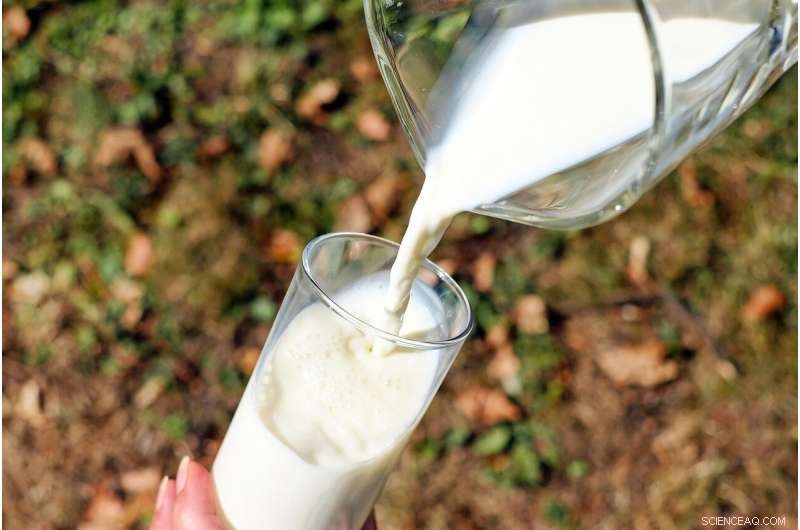
Krediet:Pixabay/CC0 publiek domein
Biotechnologie startup TurtleTree wil de manier waarop mensen melk consumeren veranderen.
Koeien zijn buiten - tenminste wat het melken betreft. De vervanger:melk op basis van cellen. Het bedrijf zegt rauwe melk te kunnen maken met cellen van zoogdieren. De cellen worden vervolgens gekweekt in de laboratoria van TurtleTree en er wordt uiteindelijk melk geproduceerd. In gigantische bioreactoren plakken de cellen aan kleine rietjes, de vloeistof wordt vervolgens door de rietjes getrokken en melk komt er aan de andere kant uit.
TurtleTree bevindt zich in de laatste fase van de bouw van een onderzoeks- en ontwikkelingsfaciliteit van 24.000 vierkante meter in West Sacramento, Californië.
Gewapend met $ 40 miljoen van durfkapitaalinvesteerders, verhuist TurtleTree van een gezamenlijke bedrijfsincubatiefaciliteit in Woodland die wordt gedeeld met enkele tientallen voedsel- en landbouwstartups naar zijn eigen onderzoeks- en ontwikkelingsfaciliteit.
De opening van de faciliteit staat gepland voor de komende maanden, hoewel er geen formele datum is vastgesteld.
"De regio Sacramento is een knooppunt voor ons", zegt TurtleTree mede-oprichter en CEO Fengru Lin. "Er is geen weg meer terug. We zijn toegewijd aan dit gebied."
TurtleTree heeft ook een hoofdkantoor in Singapore, de stadstaat waar Lin vandaan komt, en een laboratorium in Boston, waar ze biotechnologie aan het MIT heeft gevolgd voordat ze naar de businessschool in Frankrijk ging.
De connectie met Sacramento heeft te maken met de campus van de University of California Davis en zijn laboratoria die melk bestuderen, wat Lin naar de regio bracht voor samenwerkingsovereenkomsten.
De Amerikaanse TurtleTree-faciliteit zal in eerste instantie 40 banen huisvesten, van voedingswetenschappers tot ingenieurs.
Of er meer banen zullen ontstaan en de regio Sacramento op de kaart zal komen als een van de eerste leveranciers van celgebaseerde melk ter wereld, is onduidelijk.
TurtleTree-opstartuitdagingen
De meeste startups mislukken en TurtleTree zal een voedselproduct moeten produceren dat consumenten zullen kopen. Er bestaan al alternatieve zuivelproducten, maar Lin zei dat plantaardige melk minder belangrijke eiwitcomponenten produceert dan koemelk.
Ze zei ook dat plantaardige melk met hun eigen reeks milieuproblemen komt. Het is bijvoorbeeld aangetoond dat amandelmelk veel water nodig heeft. Havermelk draagt bij aan problemen zoals monocropping, wat de bodemgezondheid aantast.
De producten van TurtleTree hebben ook de goedkeuring nodig van de federale Food and Drug Administration. Op cellen gebaseerde melk is momenteel niet goedgekeurd voor aankoop.
Succes voor TurtleTree zou de regio's van Sacramento helpen bij het bouwen van een hub voor biowetenschappelijke technologie.
Baanbrekend begon afgelopen februari op Aggie Square, een complex van meer dan $ 1 miljard op de campus van de University of California Davis Sacramento dat wordt gebouwd om life science-bedrijven aan te trekken. Maar het grootste deel van de 1,2 miljoen vierkante meter aan laboratorium- en kantoorruimte is niet verhuurd.
Hoe populair kan op cellen gebaseerde melk zijn?
Er is beperkt onderzoek gedaan naar de markt voor melk op basis van cellen, waarbij één onderzoek het een nicheproduct noemde. Maar een nicheproduct met een beperkte verkoop kan nog steeds een financiële goudmijn zijn in de wereldwijde zuivelindustrie met een waarde van 871 miljard dollar.
Lin stelt dat melk op basis van cellen leidt tot vermindering van dierenmishandeling, gezondheidsproblemen bij de consumptie van melk en milieuproblemen.
Ze zei dat zuivelinname vanuit gezondheidsoogpunt in verband is gebracht met zowel een hoog cholesterolgehalte als een hoge bloeddruk. Anderen mogen geen conventionele melk kopen vanwege lactose-intolerantie.
Lin zei dat er zich ook duurzaamheidsproblemen voordoen. De zuivelindustrie wordt in verband gebracht met hoge uitstoot van broeikasgassen, de achteruitgang van lokale watervoorraden en het verlies aan biodiversiteit.
Wat is de smaak?
But even if everything goes right for TurtleTree, cell-based milk won't be flying off the supermarket shelves without great taste.
While some consumers in select areas of the west and east coast of the U.S. might buy a product because it is healthy or doesn't damage the environment, Lin said the majority will be swayed by taste.
"I sincerely believe we will make food that thrills, delights, and tantalizes again—and then the revolution can truly begin," she said.
Lin said the goal is for people to actually choose alternative proteins not because of what they intellectually know (that it's good for the planet, animals, and their health), but because it's what they intrinsically want.
On Sept. 27, TurtleTree hired chef and sustainability advocate Dominique Crenn as its food innovation advisor, part of the plan to turn out food products that taste good.
Crenn is the only female chef in the United States to receive three Michelin stars, for her flagship restaurant Atelier Crenn in San Francisco. She was also the star of Netflix's hit series "Chef's Table."
History of TurtleTree milk
TurtleeTree was born in 2019 in Singapore. It came out of Lin's desire to learn cheese making.
"I went up to Vermont for a couple of weeks to learn how to make cheese, and I wanted to make cheese in Singapore and Asia, but of course there are no cows," she said. "I had to try to access milk from Indonesia, from Thailand. And yet today there are problems around farming, around hormones and antibiotics coming to the cows, and that affects the milk quality, that affects how the cheese pans out. So I gave up that whole idea."
Starting in 2020, TurtleTree raised the first of $40 million in venture capital funding. She said the money should allow the company to continue its research and commercialization of products.
The name, TurtleTree, and its fingerprint-like logo represent longevity and the team's mission to unlock solutions that help nature and humans at the same time. "Our goal," Lin said, "is to be seen as the gold standard for sustainable food technology when it comes to milk production".
Lin sees the production of cell-based milk being at least several years away in part because TurtleTree needs to refine the process of extracting high-value dairy-based bioactives like lactoferrin in a cost-efficient way.
She said extracting lactoferrin from cow's milk is a highly costly and inefficient process- for one, cow's milk only contains lactoferrin in very low concentrations (only 100mg/1L of milk i.e. about 0.0001%.) as compared to human milk.
Lin said cell-based milk needs to be price competitive with regular milk for it to sell. She said market prices can fluctuate between several hundred dollars to $2000 for a kg of bovine lactoferrin.
TurtleTree is also looking for revenue sources sooner rather than later so it is developing more immediate plans to get its products or ingredients on supermarket shelves such as nutritional productions for infants or the elderly that are much more expensive than the average price of milk.
Lin said TurtleTree is exploring contracting with existing food companies to put its lab version of lactoferrin in their products or co-branding a joint product.
TurtleTree also has several competitors who are trying to produce cell-based milk including an Israeli company, Wilk Technologies. The company has gone public and received $2 million funding from Coca-Cola in Israel.
While the $40 million in initial funding will allow TurtleTree to continue its research and development for several years, Lin said more funding is essential to the company's long-term vision of producing environmentally friendly, sustainable milk products.
She hopes that food products expected to be introduced in the marketplace next year will demonstrate to investors that a new funding round is in order.
"We are trying to set ourselves up for success," she said.
Hoofdlijnen
- Dit is waarschijnlijk waarom je een geest hebt gezien, volgens Science
- Vissen kunnen ander gedrag gebruiken om zich tegen parasieten te beschermen
- Een kungfu-kick leidde onderzoekers naar 's werelds oudste complete visfossielen. Dit is wat ze hebben gevonden
- Een betere manier om RNA-virusnaalden te vinden in hooibergen van databases
- Overeenkomsten in de structuur van mitochondria en chloroplasten
- Algemene kenmerken van Protista
- Waarom hebben cellen voedsel nodig?
- Langstlevende dolfijn in gevangenschap sterft in aquarium Japan
- De oppervlakte van een cirkel berekenen
- Waarom insecten zich kunnen ontwikkelen uit onbevruchte eicellen
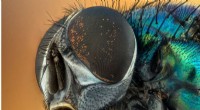
- Is een mooie zangvogel een invasieve soort geworden in Groot-Brittannië?
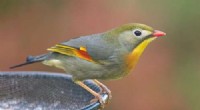
- griezelige vraag bij vogelgriep:hoe dood je miljoenen pluimvee
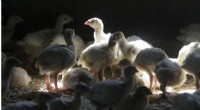
- Twee van 's werelds theesoorten uitgestorven in het wild volgens nieuw rapport
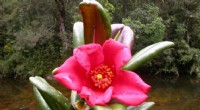
- Klein knaagdier, grote eetlust:onderzoekers identificeren de voedingseffecten van invasieve muizen op de Farallon-eilanden

 Wat breekt een dubbele DNA-helix uiteen?
Wat breekt een dubbele DNA-helix uiteen?  ID-microstructuur van aandelen nuttig in financiële crisis
ID-microstructuur van aandelen nuttig in financiële crisis Onderzoekers ontwikkelen natuurlijke eiwitkooi voor verbeterde afgifte van kankermedicijnen
Onderzoekers ontwikkelen natuurlijke eiwitkooi voor verbeterde afgifte van kankermedicijnen Veranderende gemeenschappen kunnen het succes van de evacuatierichtlijnen van IJsland beïnvloeden
Veranderende gemeenschappen kunnen het succes van de evacuatierichtlijnen van IJsland beïnvloeden Renault blijft ondanks Amerikaanse sancties in Iran:CEO
Renault blijft ondanks Amerikaanse sancties in Iran:CEO Gebrek aan evaluatie bij het tegengaan van gewelddadig extremisme kan de terreurdreiging vergroten
Gebrek aan evaluatie bij het tegengaan van gewelddadig extremisme kan de terreurdreiging vergroten Zorg voor genie in ontwikkelingslanden
Zorg voor genie in ontwikkelingslanden Hoe overleef je een tactische atoombom? Defensie-experts leggen uit
Hoe overleef je een tactische atoombom? Defensie-experts leggen uit
- Elektronica
- Biologie
- Zonsverduistering
- Wiskunde
- French | Italian | Spanish | Portuguese | Swedish | German | Dutch | Danish | Norway |

-
Wetenschap © https://nl.scienceaq.com


